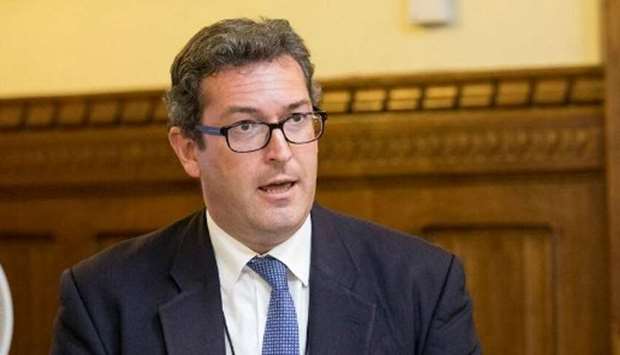A British human rights activist who has criticised the jailing of democracy campaigners in Hong Kong was barred Wednesday from visiting the semi-autonomous Chinese city.
Benedict Rogers, who is deputy chairman of the Conservative Party's human rights commission, arrived from Bangkok in the morning but was turned away by immigration.
‘They didn't provide any reason at all, that is really a strange thing,’ he told AFP by phone after returning to Thailand the same day.
Rogers said he had received an indirect message last week from the Chinese embassy in London, warning that his entry to Hong Kong could be denied. He said the message came via a third party whom he did not identify.
The activist said he believed the embassy had somehow become aware of private discussions he had had about possibly visiting the campaigners in prison, which he later realised would not be possible.
‘It's very clear that the decision in my case was not taken in Hong Kong, it was clearly taken by the Chinese government,’ Rogers said.
‘(This) is extremely concerning for what it means for 'One country, two systems'‘.
Britain handed Hong Kong back to China in 1997 under a ‘One country, two systems’ formula intended to protect its freedoms and way of life. The semi-autonomous city is supposed to handle its own immigration affairs.
Hong Kong's immigration department said it did not comment on individual cases.
The British foreign office said it was urgently seeking information on the reasons for Rogers's exclusion. ‘We have always said that we expect 'One Country Two Systems' to be respected,’ it said in a statement.
- 'Serious blow' -
The barring of Rogers came a week before a major congress in Beijing of the ruling Communist Party.
Former Hong Kong government chief secretary Anson Chan described Wednesday's incident as ‘another serious blow’ to the agreement guaranteeing Hong Kong a high degree of autonomy.
Critics say China has been tightening its grip over Hong Kong since a major pro-democracy protest in 2014 known as the Umbrella Movement.
Activists including 20-year-old Joshua Wong, Nathan Law, and Alex Chow were jailed in August for breaches of law during the movement, prompting concern from campaigners and rights groups about the city's judicial independence.
Rogers -- who lived in Hong Kong between 1997 and 2002 -- had spoken out against the jailing of Wong and others.
Their imprisonment ‘is one of the most grotesque miscarriages of justice I have seen,’ not in its severity but symbolically, he wrote in an opinion piece in August.
‘Hong Kong used to be the one part of China that was still free, where people could still protest without fear, where the rule of law and basic rights still meant something. No longer,’ he wrote.
Hong Kong's chief executive Carrie Lam, who delivered her first policy address on Wednesday, declined to comment on Rogers's case at a news conference.
Lam said in her speech that Hong Kongers have a duty to stand up for China over threats to its sovereignty.
Chinese President Xi Jinping, who visited Hong Kong in July to mark 20 years since its handover, warned of a ‘red line’ when it came to challenging Beijing's control.

